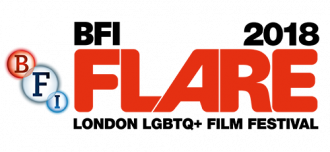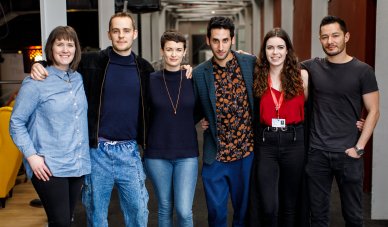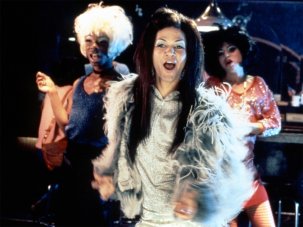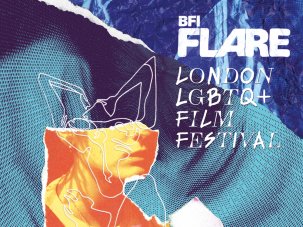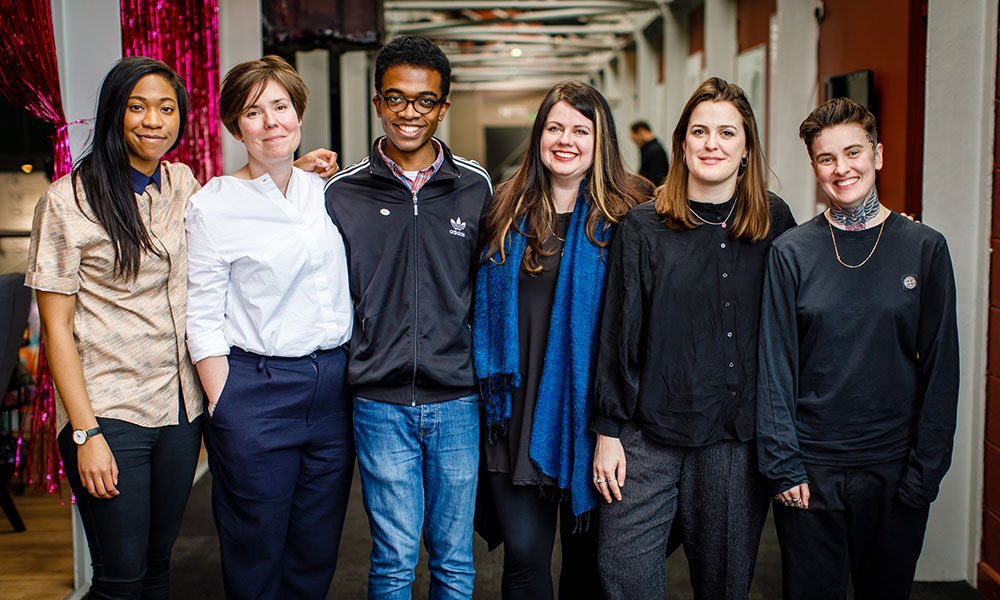
Credit: Tim Francis
Now in its fourth year, the BFI Flare Mentorships are a partnership between BFI NETWORK, BFI Flare and BAFTA. The programme brings together a group of emerging LGBTQ+ filmmakers to receive mentoring by a senior figure from the film industry, a bespoke programme of events and roundtables during BFI Flare and through the year in order to help develop their industry knowledge, professional connections, and gain an overview of LGBTQ+ features entering the marketplace.
Selected through an open submission process, applications we received in 2018 showed the breadth of LGBTQ+ filmmaking voices in the UK. We are pleased to announce the six exciting new producers, writers and directors working across genres and disciplines.
They join a growing alumni of filmmakers supported by the programme over the last three years. Meet the filmmakers who have been selected for this year’s BFI NETWORK @FLARE Mentorships in partnership with BAFTA.
Mentors will be announced after the Festival.
Sorcha Bacon, producer

Credit: Tim Francis
Sorcha Bacon is a BAFTA-nominated producer based in London. In 2013 Sorcha founded Try Hard Films, instead of revising for her university finals, a company dedicated to pushing character-led stories that focus on marginalised voices. One of her earliest shorts, Sunday Morning Coming Down, directed by Harry Lighton, screened internationally at festivals, including Cork, Edinburgh and Athens. She recently won Best Short at the BFI Future Film Festival for a short experimental documentary on Yarl’s Wood Detention Centre called Calling Home. In 2017, her short film Wren Boys was commissioned as part of Film London’s 2017 slate, which it went on to win before premiering in competition at BFI London Film Festival. Wren Boys has been both BAFTA and BIFA nominated, won the UK Film Festival and has screened in competition at festivals, including Sundance, Flickerfest, SXSW and Athens. Sorcha is currently building her feature slate, which includes developing a first feature with director Harry Lighton (BFI Flare Mentee 2017).
Sorcha on the challenges and opportunities for LGBTQ+ filmmakers
There has undoubtedly been a refreshing wave of queer films hitting the ‘mainstream’ in the last few years. Yet this has been oddly unbalanced towards cis-male centred gay films. Carol is the obvious exception, but there doesn’t seem to be nearly as many contemporary lesbian films out there. Films that seem to be made for women by women are often low budget, often tragic or comical and buried at the bottom of Netflix’s LGBT section. And when there are success stories, the emphasis is often squarely on societal obstacles in the way of their freedom to love. There is a real lack of female-centred queer narratives where love is hopeful. The most obvious block to me seems to be with the gender of the directors behind these films, with a far higher proportion of men directing high-profile queer films featuring female characters — most obviously Carol or The Handmaiden. We need to continue to challenge the stereotypes that are often used to limit women filmmakers, but more importantly we need to do more to push the films they are given the opportunity to make.
Sorcha on an admired filmmaker
The most exhilarating film I saw last year was Julia Ducournau’s debut Raw. I can’t say I am usually a horror or gore fan, but the film can’t be boxed in by those generic categories. I watched this at home with my best friend, and we both found ourselves squealing with laughter while holding on to each other through the nauseating finger-eating yuckiness and were totally shellshocked when it finished. Now I’m not about provocation for the sake of it, but I want my audiences to be glued to the screen. Ducournau nails that. Her film was fresh and smart. I loved the way she explored the female body through blood, sweat and botched Brazilians, and launched a protagonist driven by female sexuality and desire, not revenge or self-defence. The use of genre to explore repression also struck a chord with my interest in queer film. It was a risk, but the kind of risk that announces a great new talent, and that’s the mark I want to leave with the films I produce. I’m gagging (!) to see what Ducournau does next.
Georgi Banks-Davies, director

Credit: Tim Francis
Georgi started her filmmaking career at the tender age of seven. She went on to graduate top of her class from the Newport Film School, after which she directed two UK lottery funded films: The Glossy Mag and Penny Collectors. Her latest short film Garfield played in competition at the 2018 Sundance Film Festival and won Best Director and Screenwriter at Discovery Film Festival, Best Actress at Underwire 2017 and made the BAFTA long-list. Represented by Independent Talent (UK) and ICM (USA), Georgi is about to embark on her next short, The Fight, written by Abby Ajayi, while also developing Garfield into an episodic series with writer Myra Appannah and her debut feature, an untitled war movie project with writer Guen Murroni. Alongside filmmaking, Georgi has established herself as a highly sought-after commercials director; her ads and documentaries screen globally.
Georgi on the challenges and opportunities for LGBTQ+ filmmakers
We’re living in a time of change, not just in cinema, but in all facets of life. The voices of the underrepresented are finally breaking through into the mainstream. As gay filmmakers we have the opportunity and responsibility right now to tell our stories in a different voice, sharing our perspective with the world and challenging the archaic established ‘norm’ of what it means to be a director. The challenge lies in changing the way films with LGBTQ+ themes are categorised. Moving away from being seen as simply an ‘LGBTQ+ film’ and instead be seen as a film, whether action, comedy, sci-fi, etc., that happens to have LGBTQ+ characters or filmmakers at the helm. Call Me By Your Name is an incredible example of a film that has proven there are huge mainstream audiences ready to embrace and celebrate films with great character and universal truths at their heart.
Georgi on an admired filmmaker
Ryan Coogler, what a dude! I admire his career trajectory, and films with 360 degree characters at their core. With Black Panther he’s shaken Hollywood, rewritten the rules and proved what we have always known to be true (by ‘we’, I speak for all the optimistic filmmakers who don’t fit the ‘straight white man’ box). People want and need to see representations of themselves as well as what matters to them on screen. In this case it goes way beyond just the black community… I’d challenge anyone to find another movie of this size with female characters that strong and independent! Finally a blockbuster for us all. His relationship with his collaborators is also notable, acknowledging he can’t understand what it’s like to see the world as a woman, he invites that perspective from his cinematographers. That I admire most. Long may he continue to shake up the establishment!
Lindsey Dryden, director-producer
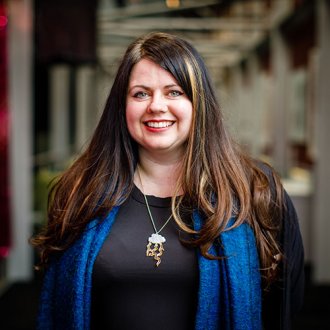
Credit: Tim Francis
Lindsey Dryden is a director and creative producer. She directed feature documentary Lost and Sound (SXSW, 2012), Close Your Eyes And Look At Me (True/False, 2009) and Jackie Kay: One Person Two Names (commissioned for Tate’s Queer British Art, 2017). She produced Sundance award-winning and Academy Award shortlisted Unrest (2017), short Little Ones (2013) for which she was nominated for a Best Producer award at Underwire, and a forthcoming series with the ACLU about transgender civil rights. Her work has screened at 50+ festivals, including SXSW, Sundance, Tribeca, HotDocs, True/False, Sheffield Doc/Fest, MIFF, CPH:DOX and Art Of The Real, been released theatrically on three continents, exhibited at Tate Britain and Modern, streamed on vogue.com, and broadcast on PBS, Netflix, BBC and Channel 4. Nominated Best New UK Filmmaker at Open City Docs and for Best Female-Directed Film at Sheffield Doc/Fest for Lost and Sound, Lindsey is a proud member of Queer Producers Collective. She founded Little By Little Films, which focuses on projects led by LGBTQ+ people, women and people with unconventional experiences of the body.
Lindsey on the challenges and opportunities for LGBTQ+ filmmakers
Part of our community’s strength has been existing on the margins, creating our own liberated identities outside of heteronormative and dominant structures, and crafting deeply intimate insights into worlds that only we would recognise. And yet, we find ourselves longing to see ourselves in the mainstream too: to see characters who just happen to be queer, and whose identities aren’t the problem at the heart of a story. One of our huge challenges is to keep building a thriving queer film world that is both gloriously independent, queer AF and non-conformist, AND relevant to non-queer audiences, so that filmmakers can express a variety of queer perspectives. And, essentially, to create sustainable economic models that nurture a broad range of films, by a broad range of LGBTQ+ filmmakers from a variety of backgrounds and experiences. Can we grow as an LGBTQ+ film community that can support a truly diverse combination of films: those made without economic gain as a marker of their success plus productions that can be significant generators of revenue? Navigating all of these sometimes-competing goals while building on the work of our queer film forebears is a challenge we need to embrace.
Lindsey on an admired filmmaker
Highest on my list (for very different reasons) are Pedro Almodóvar, Andrew Haigh, Lucia Puenzo and Jane Campion, but Desiree Akhavan is the filmmaker I’m thinking most about at the moment. Watching The Miseducation of Cameron Post at Sundance earlier this year gave me a whole new level of appreciation for Akhavan’s work: the film is funny, sexy, charming, tender, intimate and also very painful when it delves into gay conversion therapy, leading us from absurdity to devastation and beyond. Watching a filmmaker develop her talents, and blossoming so effectively, has made me really admire Akhavan and her path.
Nosa Eke, writer-director

Credit: Tim Francis
Nosa is a London-based writer and director. She attended the National Film and Television School and received a scholarship from the Royal Television Society and Sky while studying. At the NFTS, Nosa finished her digital series The Grind, and it went on to screen at Underwire Festival, among others, as well as at the Sony Pictures Entertainment studios in LA, Picturehouse Central and Genesis Cinema. Her past shorts include Moments Before Goodbyes and Two Scoops, the latter of which was shortlisted for Robert Rodriguez’s Keep Moving competition. Nosa has written an interactive digital experience for 2017 FutureBook award winning start-up UNRD. She is an associate artist at B3 Media and holds a residency at the Nottingham Mixed Reality Labs. In 2017, Google Creative Labs creative director, Tea Uglow, chose Nosa as a future creative leader. She was also handpicked to direct content for Vodafone’s new youth brand VOXI. Nosa is currently a writer for an upcoming EA game and will be directing a digital drama with development financing from B3 Media and MRL.
Nosa on the challenges and opportunities for LGBTQ+ filmmakers
One of the biggest challenges for an LGBTQ+ filmmaker is fighting for us to be included in the telling of our stories on a larger scale and to a bigger audience. I’ve become more aware that a lot of the stories in the mainstream focused around LGBTQ+ characters are not from LGBTQ+ writers or directors. There are many LGBTQ+ filmmakers that make films, but those are often put in the ‘niche’ category and therefore pushed away from a mainstream audience. As a product of this, these characters are often presented with images that seem false to us on screen. Fortunately I’m seeing a recent shift happening as queer millennials are telling their stories and putting their films or shows out into the world to find a mainstream audience by any means necessary — for example, through the internet, using available technologies. Gatekeepers are starting to take notice, giving these projects a way to be seen by a wider audience. We can look to the examples of content like Carmilla, Brown Girls and Almost Adults.
Nosa on an admired filmmaker
For me Issa Rae is a huge inspiration as a filmmaker but also as a content creator for all mediums. Before she worked in the television space, she honed her craft making shorts and web series online. Growing up watching her content made me realise that I didn’t need fancy equipment, a production company or even a broadcaster to make something. Her work ethic and her depictions of black people as complex but also sometimes carefree has always struck a chord with me. She doesn’t present her characters as flawless in their blackness but also doesn’t depict her black characters as slaves or thugs – stereotypes that are still so prevalent in the media. It helps the generation coming up to not have to fight so hard to get characters that may seem unfamiliar but are a part of the black experience on screen.
Emily McDonald, documentary director-producer
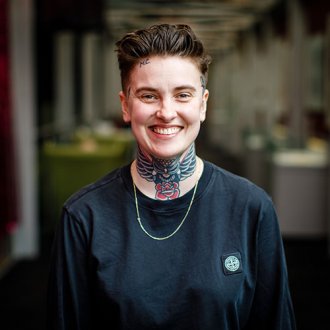
Credit: Tim Francis
At 16 Emily moved to London on her own and after a few years working in restaurants managed to find a job as a runner. From there she began to forge her skills in filmmaking by freelancing with companies such as Vice, BBC Three, Channel 4 and The Tate, among others. Recent highlights include short documentary Incomplete, which was shown at BFI Flare, Shogun, which screened at BFI London Film Festival, and a Gold Young Director’s Award for The Hardest Word. Emily’s ambition to be an approachable person both in life and when filming is reflected within her documentary films, where her subjects are often people she has met at street level. She strikes up conversations with people and creates a connection, which allows them to open up. But more importantly they feel comfortable enough to do so, knowing their story is safe in her hands.
Emily on the challenges and opportunities for LGBTQ+ filmmakers
The LGBTQ+ community has incredible stories to tell, which don’t find their way to mainstream media often enough. Seeking financing for stories that are still considered ‘unconventional’ can be challenging. However, I believe this situation has created an incredibly resourceful and visionary generation of filmmakers. Personally, I have met the most incredible people throughout my experience as a director. I have chosen to tell the stories of people within our community whose voices are powerful, and I am proud to be part of a peer group that is both creating and consuming these films.
Emily on an admired filmmaker
I really love Andrea Arnold. American Honey was such an ambitious film from start to finish. I love the fact that a British female filmmaker was able to capture American youth in such a unique way, and love the fact that it was so heavily street-cast. I’m inspired by the way she was able to translate this story for a mainstream audience, while retaining the special moments that make the story of youth so amazing.
Matthew Jacobs Morgan, writer-director

Credit: Tim Francis
Matthew is an award-winning writer and director from London. His first TV script, Dylan & Gracie, is in development with Tiger Aspect Productions, and he has been selected for Channel 4 Screenwriting 2018, where he is developing a TV show about queer vampires entitled Vamping. Matthew’s first feature film, Mine, is in development with producer Georgia Goggin (We Love Moses). It’s an adaptation of his short film by the same name that was screened at Inside Out Toronto, Aesthetica Film Festival and Image Nation LGBT Film Festival Montreal, among others. The film zeroes in on the politics of gay parenthood and starred Joshua McGuire (Lovesick) and John MacMillan (Chewing Gum). Matthew’s first short Gracie was funded by IdeasTap and B3 Media and won various awards as well as screening internationally, receiving its TV broadcast on London Live. It stars Rakie Ayola (Harry Potter and the Cursed Child), Kate Dickie (Couple In A Hole) and Angela Wynter (Eastenders). Matthew began his career in acting with credits including Love Nina, Cuffs and Wasted.
Matthew on the challenges and opportunities for LGBTQ+ filmmakers
It is important to remember that the letters in LGBTQ+ mean different things, and to not conflate all of them into one thing, which I think is often the case. We have an opportunity to tell diverse stories that represent how complex and varied our experiences are. I also often find that LGBTQ+ films are focussed on the notion of ‘coming out’, or discovering one’s sexuality/identity. However, the stories that interest me the most are of what comes after that, or where sexuality is not at the forefront of the story. Another challenge is to convince a mainstream audience that LGBTQ+ films aren’t niche. If I can watch Annie Hall or Kramer vs Kramer and relate to the experiences of those characters despite the fact that they are so far removed from my life, straight people should be able to watch an LGBTQ+ movie without freaking out! They’re films about the human experience, and there’s something that all of us can relate to in that. Finally, we have an opportunity to ensure that there’s representation behind the camera as well as in front.
Matthew on an admired filmmaker
I adore Richard Linklater’s work. I have watched the ‘Before…’ trilogy more times than I care to admit. I strive for a career like his. He is able to balance big budget mainstream studio comedies such as School of Rock or Bernie with quiet, moving independent films. I also love how natural and chatty his dialogue is. I find it so believable and affecting. For me, Boyhood is an absolute standout film. He created a world that is so imbued with a sense of time and place that you can practically smell it, and with complete authenticity. One of my main takeaways from his movies is that character should absolutely come before plot. Sometimes very little happens plot-wise in these films. However, the characters are so engaging and their world is so rich and full of life that you can’t help but be glued to the screen.
Past BFI Flare Mentorships


